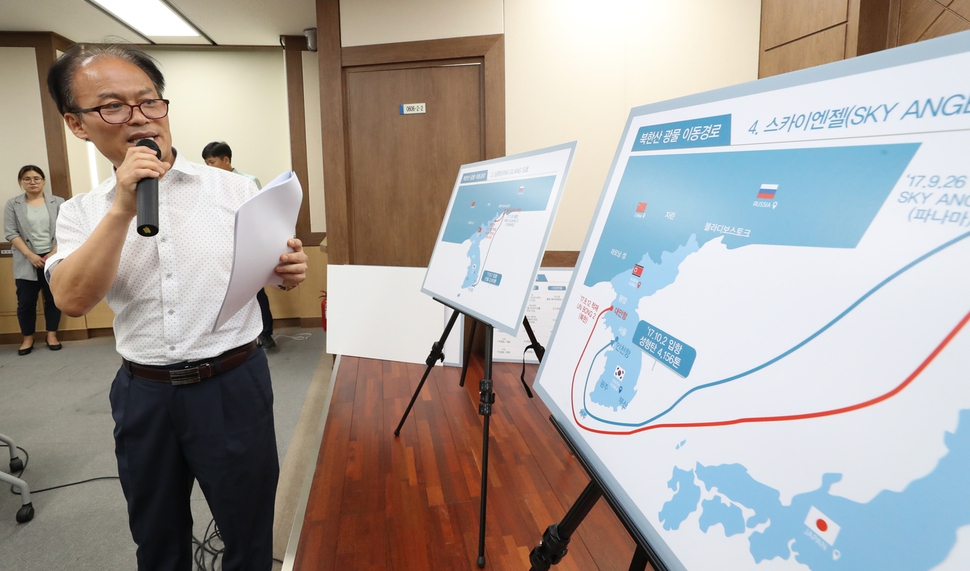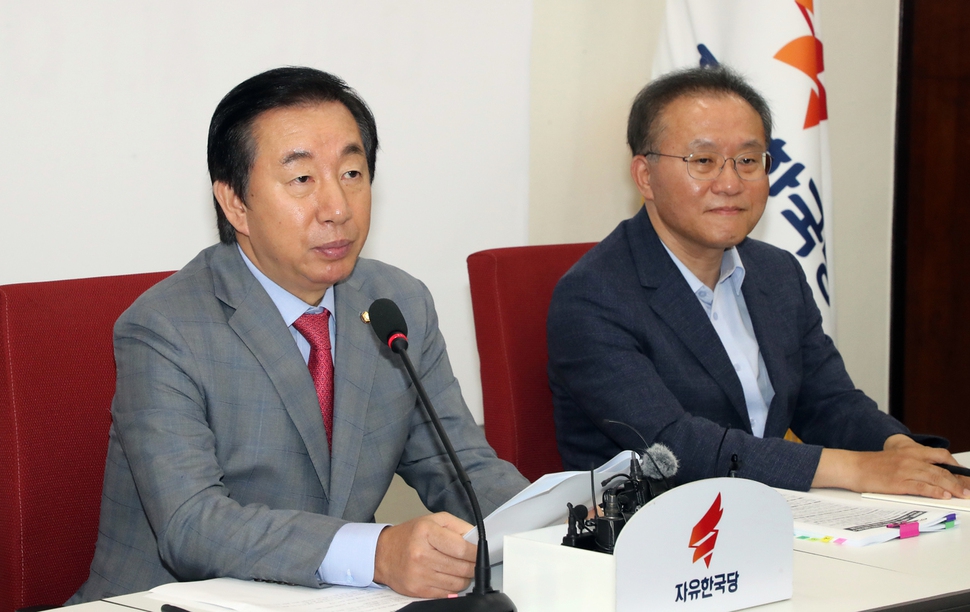Posted on : Aug.11,2018 15:03 KST
Modified on : Aug.11,2018 15:10 KST
 |
|
The Korea Customs Service (KCS) announces the results of its investigation of South Korean companies illegally imported North Korean coal at the Daejeon Government Complex on Aug. 10. (Yonhap News)
|
Three South Korean firms used forged place-of-origin certificates
Allegations that North Korean coal was brought into South Korea have been proven true. The South Korean government officially announced confirmation on Aug. 10 that three domestic importation corporations brought 35,038 tons of North Korean coal and pig iron (worth 6.6 billion won, or US$5.8 million) into South Korea with forged place-of-origin certificates between April and October 2017.
In an interim investigation announcement on the “disguised importation of North Korean coal, etc. case” at the Daejeon Government Complex, the Korea Customs Service (KCS) reported violations of customs law in seven out of ten cases investigated and decided to refer the case to prosecutors with a recommendation to indict three individual importers and three corporations.
Four of the seven cases concern violations of UN Security Council Resolution 2371 (adopted on Aug. 5, 2017), which bars the supplying, sale, and relocation of North Korean coal. The other three cases occurred before the UN resolution was adopted and are being considered only as violations of South Korea’s independent “May 24 measures” adopted after the ROKS Cheonan sinking in 2010 according to the Inter-Korean Exchange and Cooperation Act. The government has announced plans to report the facts of the case to the UNSC’s North Korea sanctions committee, including its entry bans of the four vessels that violate the UNSC resolution (the Sky Angel, Rich Glory, Shining Rich, and Jinlong).
 |
|
Liberty Korea Party floor leader Kim Sung-tae holds a press conference regarding the illegal importation of North Korean coal at the National Assembly on Aug. 10. (Yonhap News)
|
Political attacks of conservative media and LKP
In a spokesperson’s statement, the Liberty Korea Party (LKP) dubbed the episode “North Korean coal-gate,” accusing the Moon Jae-in administration of concealing and/or abetting the violation of UN sanctions and demanding a parliamentary audit. These allegations went far beyond what might be seen as the “sensible response,” such as holding a meeting of the National Assembly Foreign Affairs & Unification Committee or other relevant standing committee for a parliamentary examination of the situation or its response measures. The conservative media have echoed the allegations of “neglect” or a cover-up by the administration and voiced fears of a secondary boycott or US independent US sanctions.
But they (intentionally) chose the wrong target. The entities charged with violating the UN resolution are three “domestic importation corporations.” By identifying their violation and taking the necessary measures, the South Korean government is enforcing the UN resolution. The LKP’s version effectively reverses the roles of “victim” and “perpetrator.” More than anything, it comes across as a political attack that deliberately disregards the facts and context.
Source of intelligence regarding ships importing North Korean goal
In Oct. 2017, the South Korean government received intelligence that there “appeared to be an instance of suspected North Korean coal entering a South Korean port via a third country.”
The source of the intelligence was the US government (more specifically, the US Embassy to South Korea). This occurred just over two months after the UN Security Council adopted Resolution No. 2371. Since the government had already been conducting its own investigation of one suspicious case since Aug. 2017, two months prior to that, it used the intelligence from the US to expand the targets of its own investigation. This occurred long before the panel of experts with the UN Security Council Sanctions Committee on North Korea published their report in March citing suspicions that the ships Sky Angel and Rich Glory had carried North Korean coal to South Korea.
Immediately after acquiring this intelligence, the relevant ministries inside the government worked together in cooperation with the Americans to search the suspected ships and to search and investigate their cargo. The government’s announcement on Aug. 10 includes administrative measures leading up to legal measures based on the interim results of the investigation and even a plan to notify the UN.
That is to say, the South Korean government has already taken or is planning to take all five of the measures that governments of member states are required to take by way of implementing UN sanctions resolutions: 1) acquiring and sharing information related to North Korean coal, 2) searching the vessels and their cargo, 3) proceeding with the investigation, 4) punishing the wrongdoers and 5) impounding the ship or banning it from entering ports.
South Korean government took immediate investigative action
In regard to the claims that the government has ignored or covered up this affair and concerns about a secondary boycott by the American government, there are three points to which we should pay attention. First, there have been no confirmed cases of North Korean coal being imported to South Korea since Oct. 2017, when the government took the necessary action related to the intelligence received from the US.
The violations by three importers occurred between April and October of last year. Second, October of last year was a perilous time on the Korean Peninsula, with people voicing concerns about war because of North Korea’s repeated nuclear tests and long-range missile test launches, and it’s a stretch to claim that the Moon administration had deliberately ignored or covered up these incidents out of concern for North Korea.
Third, it’s important that the party that provided the South Korean government with the intelligence in question was the US government, which has been leading the sanctions against North Korea in the international community. It would be impossible for Seoul to cover up intelligence about suspected sanctions violations that it had received from the US. In fact, US State Department Spokesperson Heather Nauert said during the daily press briefing on Aug. 9 that the US is working closely with the South Korean government and trusts it.
Independent sanctions by the US, such as a secondary boycott, are considered and applied when 1) there is repeated and systematic violation and evasion of sanctions and 2) when it is believed that the government of the country with jurisdiction has not taken adequate measures, such as investigating the matter. Since the South Korean government has been working with the US government on this case since the outset and since it was the South Korean government who exposed these cases, Seoul is confident that a secondary boycott or other independent sanctions by the US are completely out of the question.
When the South Korean government notifies the UN Security Council Sanctions Committee on North Korea of the cases of violations of the UN Security Council resolution, the committee will circulate the facts in question to the 15 member states of the UN Security Council for their perusal. It’s possible that the four ships that violated Resolution No. 2371 will be added to the sanctions list against North Korea, but a South Korean government official said this was “unlikely,” because it would require the unanimous consent of all 15 member states.
By Lee Je-hun, senior staff writer, Noh Ji-won, Lee Jung-gook, and Song Gyung-hwa, staff reporters
Please direct comments or questions to [english@hani.co.kr]










